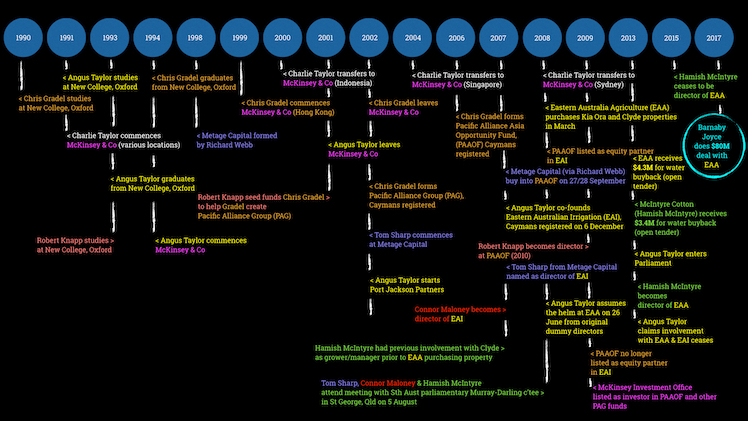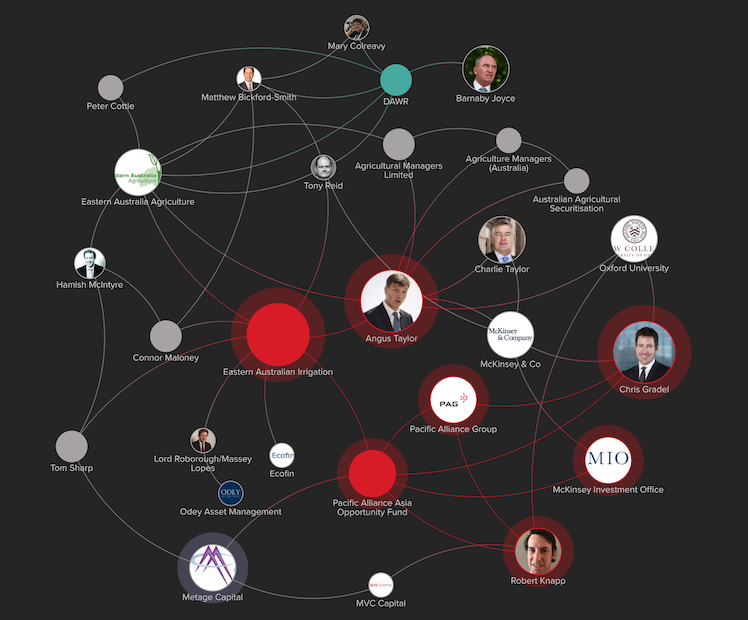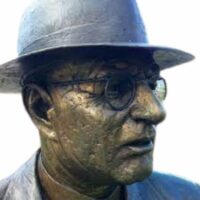Hopes of exposing the Cayman Island beneficiaries behind the Watergate mystery are not entirely dashed in the wake of the Coalition’s election victory, but they have surely receded. There will be no Royal Commission, perhaps no revealing of documents for now. Yet the mystery persists. In this investigation, Jommy Tee and Ronni Salt, the characters celebrated on Twitter for many a Watergate chapter, untangle the web of key identities, wealthy but low-profile financiers mostly, behind Australia’s most lucrative water deal.
AS THE cold mist from the Thames River dispersed in the winter evenings of the early 1990s, three young men from Oxford University would make the pilgrimage between their digs at the prestigious New College and the college rowing sheds on the Isis river.
Their fates intertwined, fortified by the College motto of “One family”, the three rowers were to end up with intersecting financial dealings.
These dealings would one day span the Pacific Ocean, the Caribbean Sea and the remote Balonne River in Queensland, eventually underpinning Australia’s $80 million #Watergate mystery.
Rower One was an Australian attending Oxford’s New College via a Rhodes Scholarship. His name, Angus Taylor. His Watergate connections would one day include a suite of associated companies:
- Eastern Australia Agriculture (EAA);
- Australian Agricultural Securitisation;
- Agriculture Managers (Australia) and two Cayman registered entities
- Eastern Australian Irrigation (EAI) of the Cayman Islands;
- Agriculture Managers Limited (AML) of the Cayman Islands.
Rower Two is a less familiar name — Christopher Marcus Gradel.
Christopher Gradel would go on to found the $50 billion dollar investment juggernaut, Pacific Alliance Group (PAG), and a slew of its associated subsidiary companies and investment funds, including Pacific Alliance Asia Opportunity Fund (PAAOF). Although PAG operates out of Hong Kong, like most of it subsidiaries, it is registered in the Cayman Islands.
Rower Three was less familiar again, Robert Christopher Knapp. Knapp was, and is, an American citizen, who was studying philosophy and politics at Oxford at the time. He would go onto found a finance company, Ironsides Partners, and fortuitously, become a director in Gradel’s Pacific Alliance Group.
Watergate ducking and dodging: More questions from Jommy Tee and Ronni Salt
But before two of the men, Angus Taylor and Chris Gradel, set their minds to a life of budding entrepreneurship, they moved on from Oxford to work at McKinsey & Company, the springboard for many bright young graduates of that era. Their time at McKinsey spanned the late 1990s and early 2000s, with Taylor working out of the Sydney office and Gradel based in the Hong Kong office.
Both men were also partners at McKinsey & Co, a seemingly insignificant, but pertinent fact.
Taylor Made
Angus Taylor’s brother Charlie Taylor, is also a long-standing McKinsey employee, a senior partner who has been with the company since 1991 and has spent a large chunk of his career in various McKinsey’s Asian offices.
The McKinsey connection is important because of a little known nexus — that McKinsey runs its own secretive investment fund through the McKinsey Investment Office Partners (MIO).
This secret fund is worth a staggering $9.5 billion in assets, and what’s more, the only people invited to invest in MIO are either current or former McKinsey employee partners.
According to the Financial Times, the one stipulation is that McKinsey partners who buy into and invest in the secret fund must be wealthy “accredited investors”, meaning they must have a net worth of at least $1 million.
“MIO invests in many companies linked to McKinsey, and has an enviable record: It has made money in 24 of the past 25 years.”
As the Financial Times disclosed at the time, the McKinsey partners serving on the board of MIO do not mention their role in any of their official company biographies. This is a modus operandi familiar to anyone who has followed the Australian #Watergate mystery, where references to EAA, EAI and AML have been almost universally omitted from official biographies such as Angus Taylor’s.
McKinsey’s Panama Connection
The McKinsey Investment Office has been mired in controversy in recent times over its lack of transparency and conflicts of interest, including being named in the infamous Panama Papers. Investigating for Fusion Media, journalist Felix Salmon brought to light a fascinating account of how the MIO was involved with major financiers via the use of a Panamanian shelf company.
“A secretive global network of the rich, the powerful, and the influential, investing in each other’s companies, and trying very hard never to talk about what they’re doing. That’s the dysfunction at the heart of crony capitalism—the system whereby the rich get richer while everybody else struggles.”
This summation cuts to the very heart of the $80 million Watergate mystery. McKinsey Investment Office, free from public scrutiny or accountability has been able to hide its members and its profits in much the same way as the Cayman’s based Eastern Agriculture Irrigation has, with the $80 million it received from the Australian taxpayer. Although dealing directly with the Australian Government, it has managed to remain answerable to no one, or to borrow from Felix Salmon, its officers have been “trying very hard to never talk about what they are doing.”
As many involved in the Australian Watergate story try to pin down exactly where the $80 million actually went, it is worth noting that McKinsey Investment Office, Pacific Alliance Group and Eastern Australian Irrigation are and were, all linked at some time, and that connection first became apparent as early as 2008.
Those following the story will know that in 2008, Angus Taylor became secretary and sole company director of both Eastern Australia Agriculture (EAA) and had co-founded and was a director of the Cayman’s based parent company Eastern Australia Irrigation (EAI). It was in this same year that Taylor, on behalf of the investors, purchased the two Queensland irrigation properties – Kia Ora and Clyde.
What isn’t widely known is that Angus Taylor appears to have drawn on his old Oxford networks because one of the investors who rushed to invest in these two obscure Queensland properties was none other than Pacific Alliance Group, headed up by Taylor’s old Oxford friend Christopher Gradel.
Via their subsidiary investment fund PAAOF, Pacific Alliance invested in EAI to the tune of $US5 million, or the equivalent of 50,000 shares.
What was even luckier for the then sole Director of EAI, Angus Taylor, was the insertion of McKinsey Investment Office into the game. In 2008, EAI was also fortunate to see McKinsey Investment Office invest part of its world-wide secret partners’ fund into Pacific Alliance Group.
We may never know if Angus Taylor himself was or indeed is a member of the secretive McKinsey Investment Office group, even though he was a McKinsey partner and indeed had the entry credentials required for the fund, because it appears that one of the first rules of McKinsey’s secret club is not talking about the secret club.

Timeline: McKinsey and Company.
But among the distant waters around the Cayman Islands, another swimmer came into view in the shape of Tom Sharp. Tom Sharp is not well known to the Watergate story but he was a consistent presence during the early years of the Caymans-based EAI. He was there as a director when the company formed in 2007 and it appears he never left.
Tom Sharp is an old associate of Angus Taylor’s and a key figure at Metage Capital, which is, not surprisingly, another international investment fund. Not much is known about Sharp although, like other EAI directors, he appears to be an investment manager. It is a small world indeed.
Along with Tom Sharp, the other international players and investors in EAI and EAA appear to all have a direct link to Angus Taylor. Tom Sharp sat as a director of EAI alongside Angus Taylor. Christopher Gradel and Robert Knapp appear to have invested in EAI via Pacific Alliance and had attended Oxford with Angus Taylor.
Coincidentally, Sharp and Knapp are also associated through another investment fund, MVC Capital.
A few others fall into the mix here as well including Connor Maloney who sat as an EAI director with Angus Taylor and who recently featured in the tabloids as enjoying of a multi-million dollar renovation of his Swiss home, and Hamish McIntyre, a former EAA director alongside Angus Taylor and one of Barnaby Joyce’s long-term associates.
McIntyre, who set up four separate companies in the same year as the $80 million Watergate sales went through, keeps himself busy with his work as head of Cotton Australia these days.
The St George Meeting
Despite their international links to high finance, most of these men also managed to find themselves in the main street of downtown St George, (population 2,395) Queensland on August 5, 2008, to meet with members of a South Australian parliamentary delegation.
It does beg the question why members of South Australia’s parliament would be meeting with directors of Cayman Island companies in the southern outback of Queensland, but such is the world of high finance and the mercurial nature of the multinational games played with Australia’s water assets, that it is not entirely surprising.
That there is a lot of money at stake here, taxpayer money to be won from selling water rights, makes the stakes high. Indeed, the Clyde and Kia Ora water held by EAA would fetch the highest price ever, per litre, for a water sale.
Here’s Barnaby
Given that St George is the former home of Barnaby Joyce and the town from where he launched his Senate bid, perhaps he may have met some of the delegation. We may never know.
So many of the questions surrounding the $80 million Watergate sale finish with the answer, “We may never know.” The people that do know where the money went aren’t speaking. People in government know, because they are the counter-parties to the notorious 2017 deal.
Angus Taylor may know because he set up the Caymans company, EAI, which got the lion’s share of the cash from the water bonanza; and although he got off the board of EAI before entering politics in 2013, he still had associates on board in the later years.
There is hope however as taxpayers deserve to know, and have not been told, who are the beneficiaries of this Caymans transaction. While taxpayers, indeed voters, deserve to know what happened to their money, the mystery of Watergate will remain just that.
——————-

Jommy Tee and Ronni Salt
Jommy Tee is a long-time career public servant, having worked in the policy development field for 25+ years as well as an independent researcher interested in politics, current affairs, and Nordic noir.
Ronni Salt is also an independent researcher, who comes from the land and has an interest in politics and current affairs. The identities of the authors are known to the editors of this publication.
You can follow Jommy Tee and Ronni Salt on Twitter @Jommy_Tee and @MsVeruca.
Public support is vital so this website can continue to fund investigations and publish stories which speak truth to power. Please subscribe for the free newsletter, share stories on social media and, if you can afford it, tip in $5 a month.


